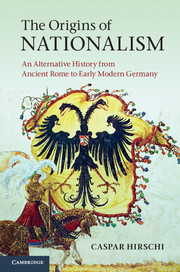Book contents
- Frontmatter
- Contents
- Figures
- Preface
- 1 Introduction
- 2 The modernist paradigm: strengths and weaknesses
- 3 Foundations of a new nationalism theory
- 4 Killing and dying for love: the common fatherland
- 5 Competing for honour: the making of nations in late medieval Europe
- 6 The nationalist transformation of borders and languages
- 7 Humanist nationalism
- 8 A German Emperor for the German people
- 9 Nation and denomination
- 10 Conclusion
- Bibliography of works cited
- Index
6 - The nationalist transformation of borders and languages
Published online by Cambridge University Press: 05 June 2012
- Frontmatter
- Contents
- Figures
- Preface
- 1 Introduction
- 2 The modernist paradigm: strengths and weaknesses
- 3 Foundations of a new nationalism theory
- 4 Killing and dying for love: the common fatherland
- 5 Competing for honour: the making of nations in late medieval Europe
- 6 The nationalist transformation of borders and languages
- 7 Humanist nationalism
- 8 A German Emperor for the German people
- 9 Nation and denomination
- 10 Conclusion
- Bibliography of works cited
- Index
Summary
Nature speaks our German language in all things which make a sound. Thus, quite a few wished to think that the first man, Adam, had only been able to name the birds and all other animals with our words, because he expressed every innate sound according to its nature; it is no surprise, therefore, that most of our root words conform to the sacred language.
Georg Philipp Harsdörffer, Treatise to Protect the Work on the German Language, 1644The bond of language, customs and even of the common name unites humans in such a strong, yet invisible way and creates, as it were, a kind of kinship. A letter or a journal concerning our nation can offend or delight us.
Gottfried Wilhelm Leibniz, Exhortation to the Germans, 1679When the members of the English and French natio were about to cross swords at the Council of Constance, a clergyman in the little town of Bielefeld, a few hundred miles further north, completed a world chronicle with the title Cosmidromius. His name was Gobelinus Person, and in his introduction he made the following observation:
While the ancients considered a division of provinces following the borderlines and the ends of rivers, mountains, forests and seas, the modern populace makes such distinctions according to the differences of vernaculars.
As a consequence, Gobelinus continued, it was now possible that a local community, depending on the means of measurement, belonged to two different provinces. By calling his contemporaries, who defined boundaries based on linguistic criteria, vulgares, Gobelinus indicated that he did not approve of this change. He perceived the replacement of natural with cultural demarcations as a bottom-up process, which was generally considered the wrong direction in late medieval society.
If we compare Gobelinus’ clear-cut distinction with other writings of the fifteenth century which deal with the political significance of vernaculars, we come to a contrary conclusion. The identification of political and linguistic boundaries seems to have been introduced top-down, from royal courts to princely estates to city councils to villages etc. In the following paragraphs, I will present the case of the German lands as an example of a more general process in Western Europe.
- Type
- Chapter
- Information
- The Origins of NationalismAn Alternative History from Ancient Rome to Early Modern Germany, pp. 104 - 118Publisher: Cambridge University PressPrint publication year: 2011



